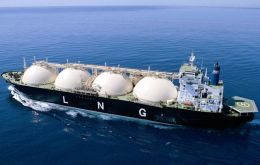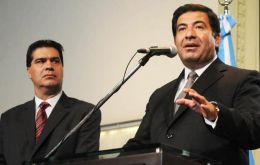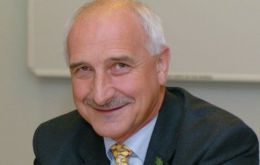MercoPress. South Atlantic News Agency
Stories for January 28th 2014
-
Tuesday, January 28th 2014 - 05:34 UTC
NY Times: the influential Minister behind Argentina’s economic shift

The following piece from The New York Times, written by Simon Romero and Jonathan Gilbertjan gives an insight into the life and thinking of the most powerful Economics minister Argentina has had in a decade: Axel Kicillof and the brains behind the current rather eclectic policies.
-
Tuesday, January 28th 2014 - 05:17 UTC
Market disruptor: nuclear restarts spells trouble for LNG

By Nick Cunningham of Oilprice.com - There are two major factors that have emerged in the last five years that have sparked a surge in LNG investments. First is the shale gas “revolution” in the United States, which allowed the U.S. to vault to the top spot in the world for natural gas production.
-
Tuesday, January 28th 2014 - 05:05 UTC
Argentine market cautious reaction to new rules on foreign exchange and dollar savings

In what promises to be a week of surprises as the Argentine government unfolds measures to contain the price of the US dollar, this Monday the peso held relatively stable after last week's sharp devaluation. While the official rate remained unchanged at 8.01 Pesos for a greenback, in the parallel market it climbed to 12.15 Pesos.
-
Tuesday, January 28th 2014 - 05:00 UTC
Brazil current account deficit ended 2013 at its widest in twelve years

Brazil's current account ended 2013 at its widest deficit in 12 years amid a weakened foreign trade balance, heavy outgoing service payments, overseas profit remittances and an overall lack of confidence in the country's economic policies.
-
Tuesday, January 28th 2014 - 04:36 UTC
Cristina Fernandez has lunch with Fidel Castro and blasts banks' “speculative practices”

Argentine President Cristina Fernández used her personal Twitter account to blast figures in the banking and financial industries, which according to the head of state used speculative practices to send Argentina into default in 2001.
-
Tuesday, January 28th 2014 - 04:27 UTC
Falklands lawmaker on political visit to New Zealand and Australia

Mike Summers Member of the Legislative Assembly of the Falkland Islands will visit New Zealand and Australia this week as part of a regional tour where he will present the Falklands as a modern, thriving democracy and address the Falkland Islanders right to self determination. There are long-standing links between the countries, and this tour hopes to build upon existing relationships.
